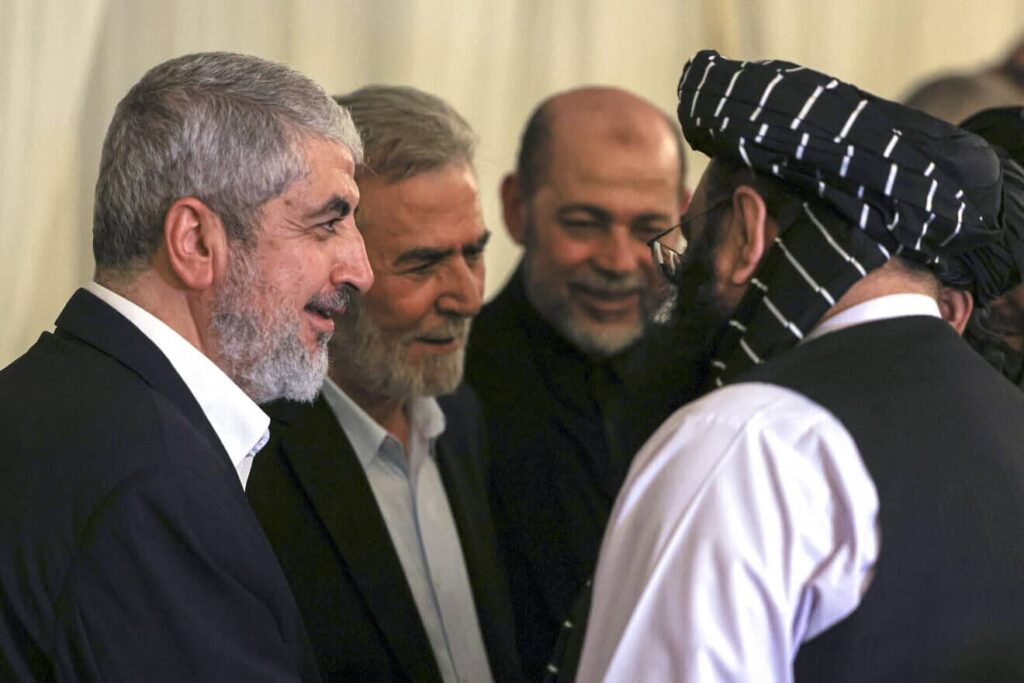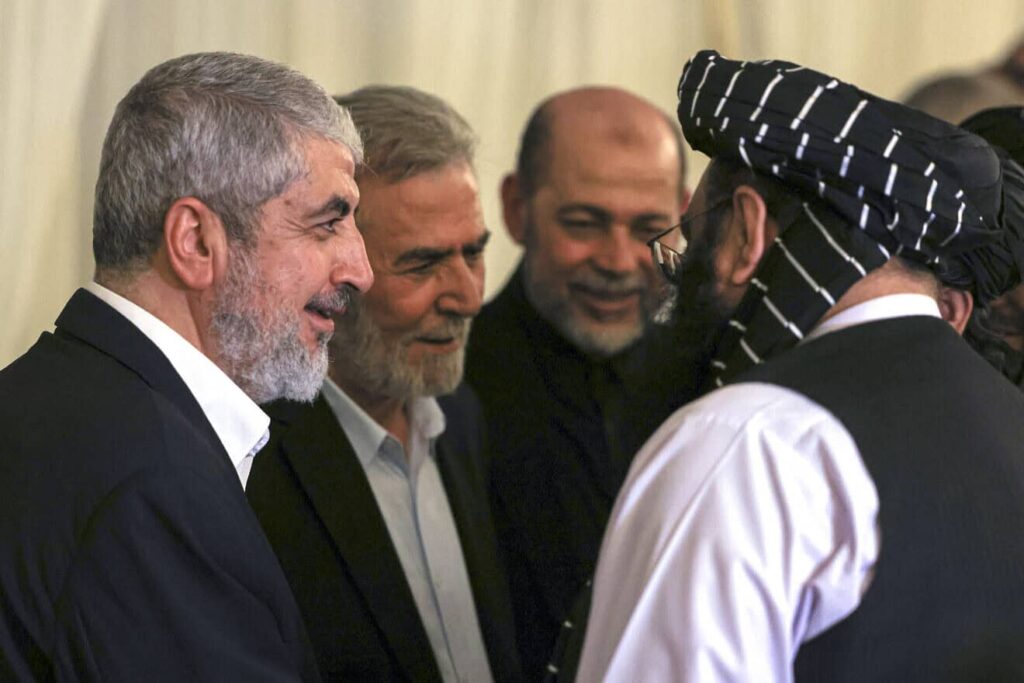
Why is Hamas so confident that it’s winning?
Despite heavy losses, the terror group knows that it will be the victor if it’s still standing when the war it started on Oct. 7 ends. And it’s staking its future on American help.
After nearly a year of suffering and grievous losses, most Israelis and Palestinian Arabs will likely observe the anniversary of the war started by Hamas on Oct. 7 with sorrow. But not everyone. An interview The New York Times conducted with Khaled Mashaal, the head of Hamas’s “political wing,” in his luxurious living quarters in Doha, Qatar, revealed he thinks the war has gone just fine.
As the Times put it, Mashaal thinks that Hamas is “winning the war” and is confident that the genocidal Islamist organization will, despite the battering it has received from the Israel Defense Forces, play a “decisive” role in Gaza in the future.
It takes an extraordinary amount of chutzpah to sit in a comfortable place of exile where you are protected by Qatar—an ally of Iran and Hamas—while the Gulf State also pretends to be friendly with the United States. It’s odd for a “political” leader to be so blithe about a conflict that has, despite the inflated statistics of civilian casualties in the Gaza Strip produced by Hamas, certainly inflicted tremendous harm on his own people. By hiding from the IDF in a warren of tunnels the size of the New York subway system underneath civilian homes, they set in motion a confrontation that guaranteed that much of the Strip would be destroyed. And Hamas itself has been severely hurt. Reportedly, 17,000 operatives have been killed, and all of its organized military formations are no longer combat-effective. The same is true of its ability to send long-range missiles into Israel.
Survival equals a Hamas victory
By any normal definition of victory or defeat, it’s hard to argue that in the aftermath of its orgy of mass murder, rape, torture, kidnappings and wanton destruction in Israel on Oct. 7, Hamas hasn’t been beaten.
But Mashaal disagrees, and it’s hard to find fault in his reasoning.
While most of us have understandably focused on the fighting in Gaza as well as the way Hezbollah terrorists have been able to essentially de-populate a portion of northern Israel with its indiscriminate fire on civilians, one of the key fronts in this war is not in the Middle East. It’s in the United States.

(Source: JNS)
Despite the fact that the overwhelming majority of Americans support Israel and oppose Hamas, the political battle over the war in Gaza has been going pretty much the way the terrorists wanted it to. That’s reflected in Mashaal’s confidence, as well as Hamas’s negotiating tactics and its strategy in Gaza. After Oct. 7, the terrorists have been doing nothing but playing for time. And they expected that the time they needed to outlast the Israeli offensive would be provided to them by Israel’s closest ally.
Biden’s flip-flops helped Hamas
At first, it seemed as if their bet would not pay off. President Joe Biden’s initial response to the Oct. 7 massacre was to join Israeli Prime Minister Benjamin Netanyahu in saying that the only proper response to this atrocious crime was for Hamas to be “eliminated.” But almost as soon as the words were out of his mouth, Biden began to slowly back away from that position.
Over the next several months as Israel’s counter-offensive into Gaza began, the United States played a double game. On the one hand, Washington continued to supply Jerusalem with munitions badly needed by the IDF; eventually, however, it was reported that the Pentagon slow-walked its delivery to maintain leverage over the Israelis. While America was playing the faithful ally in one respect, Biden and his administration were soon singing a different tune about the war.
Biden was heavily influenced by the open revolt against a pro-Israel policy from lower-level administrators and congressional staffers. With the Democrats’ left-wing base similarly outraged by his initial position of stalwart backing for Israel and the war on Hamas, he realized that it might imperil his chances of re-election. As a result, statements about the war soon were more about its impact on the Palestinians rather than the need to eliminate the terrorists who committed the largest mass slaughter of Jews since World War II and the Holocaust.
This tilt to the left would escalate as the presidential campaign began in early 2024, with gestures from Biden intended to appease the pro-Hamas antisemitic voters in Arab-American strongholds like Dearborn, Mich., as well as woke left-wing activists who falsely label Israel a “settler/colonialist” and “apartheid” state. Rather than push back against the left’s demand for an immediate ceasefire that would essentially save Hamas, the administration began echoing it and pushing for a deal that would end the war at virtually any price, even if it didn’t result in freedom for all of the Israeli hostages still held by Hamas.

And when Israel forced Hamas’s fighters back into their last enclave in southern Gaza, Biden and Vice President Harris were just as vocal about demanding that Israel not enter Rafah as the antisemitic demonstrators on America’s streets and college campuses.
While the public pressure on Israel was bad, even worse was the duress the administration was employing against Netanyahu behind the scenes as it sought to delay every Israeli effort at finishing off the terrorists.
Administration officials were soon parroting the defeatist line about Hamas being an “idea” that could not be defeated, rather than a terrorist force that could be eliminated. Plenty of “ideas” have been militarily defeated, such as Nazism, which didn’t survive the defeat of Adolf Hitler’s genocidal regime. But to Americans and Israeli liberals, Hamas is regarded as an eternal force. By adopting this position, the opportunity to convince Palestinians to give up their fantasies about Israel’s elimination was thrown away and their century-long war on Zionism prolonged.
Combined with the post-Oct. 7 surge in antisemitism made obvious by the pro-Hamas encampments at elite universities, it gave Hamas every reason not to negotiate seriously for a hostage release deal. As Mashaal told the Times, Hamas viewed all of this as encouragement for its plan to simply hunker down in its remaining tunnel strongholds, and hold out until U.S. and international pressure—heightened by the anti-Israel bias of the mainstream media—forced Israel to stand down and allow the Islamists to emerge as the victor in the war.
Demoralizing the Israelis
It must be recognized that a key element in the Biden administration’s efforts was the fact that, as the Times story also noted, many in the leadership of the IDF and Israeli security establishment had adopted similarly defeatist stands about dealing with Hamas.
The conduct of the military leadership—both before and after Oct. 7—will be a subject for formal investigations and then historical inquiry for many decades. Suffice it to say that this attitude about Hamas seems very much a product of the same thinking that left the country unprepared for the attacks that Shabbat morning and then needing weeks before it could initiate an attack on the perpetrators.
It should be noted that Netanyahu bears responsibility for these failures as the head of the government. But the military leadership should not be shielded from the same opprobrium because of the respect their uniforms and records inspire. As I’ve heard from so many Israelis in the last year, if the war has not always gone as well as it should have, it was always the fault of the generals, not the rank-and-file soldiers and lower-level officers who have fought bravely and often sacrificed their lives in order to limit Palestinian casualties.
While Israelis have every right to protest against their government even in wartime, Hamas also views the unrest inside the Jewish state as an asset. The families of the remaining hostages and Netanyahu’s political opposition now seek to pressure him to give up the war and sign a ceasefire agreement, even if it means essentially handing Gaza back to Hamas and ensuring a repeat of the horrors of Oct. 7. I understand why some feel that way for a number of different reasons, but the fact remains that Hamas is counting on that sentiment.
Claiming U.S. ‘recognition’
But above all, Hamas views American pressure on Israel as its ace in the hole. As Mashaal pointed out, the way that the hostage negotiations have been handled by Washington has amounted to American “recognition” of Hamas as a diplomatic partner as opposed to a despised and outlawed terrorist organization. He’s right about that.
While it’s not clear just how closely they are observing the presidential election or counting on one outcome over another, they obviously prefer Harris’s stand in favor of an “immediate ceasefire” to former President Donald Trump’s comments, which amount to a green light to Israel to “finish the job” of eliminating the terrorists.
Hamas’s military position inside Gaza is not completely eliminated, but it is a shadow of its pre-October self. And there are even reports now starting to circulate about Gazans drawing some obvious conclusions about the high cost of letting Hamas lead them into disaster after disaster. Even as Israel’s focus is increasingly turning towards its northern border and the imperative to stop the Hezbollah fire that has depopulated a large area in the direct line of terrorist fire, the need to continue the work of demolishing tunnels and rooting out remaining Hamas elements is not over. It may take years—something that discourages Israelis, and that infuriates Biden and Harris. But the notion that there is any realistic alternative to continue fighting that would ensure Israeli security—whether in the form of a ceasefire/surrender or bringing international forces into Gaza to stop Hamas—is a pipe dream.
The reality of Palestinian politics
As the Times article makes clear, Hamas will never budge from its demands that Israel hand back Gaza to them. And as long as they are useful to their cause, they will hold onto many of the hostages, despite the belief among some Israelis that it is Netanyahu’s stubbornness or political ambition that is the obstacle to their freedom. Moreover, Hamas leaders are right to believe, despite the understandable anger in Gaza, that the basic equation of Palestinian politics remains unchanged. Over the last century, Palestinian groups and leaders have always gained credibility primarily by shedding Jewish blood. Hamas thinks that it will eventually reap a great benefit from the atrocities of Oct. 7 in the form of broad support that will enable it to topple and replace Palestinian Authority leader Mahmoud Abbas’s Fatah Party in Judea and Samaria as well as Gaza. All they have to do to cash in on that is to survive the war, and they think they’ve found the formula to enable them to do just that.
If left to carry out its tasks without foreign interference, the IDF will eventually eliminate Hamas, though that task will not be accomplished easily or quickly. It can certainly prevent it from returning to power in Gaza, thus ensuring that its reign of terror over Israel as well as Palestinians is over. Still, Mashaal and the rest of the terrorist group are counting on feckless American politicians, ideologically motivated leftist demonstrators and political activists, a media that is always prepared to demonize Israeli efforts at self-defense, as well as war-weariness and anguish about the hostages inside Israel to guarantee their survival. We may hope that they are wrong about that, but it’s easy to understand why the terrorist leader is confident that he can outlast the Israelis … with American help.
Jonathan S. Tobin is editor-in-chief of JNS (Jewish News Syndicate). Follow him @jonathans_tobin.
** This article was originally published on JNS.org **
The post Why is Hamas so confident that it’s winning? appeared first on Israel365 News.
Israel in the News